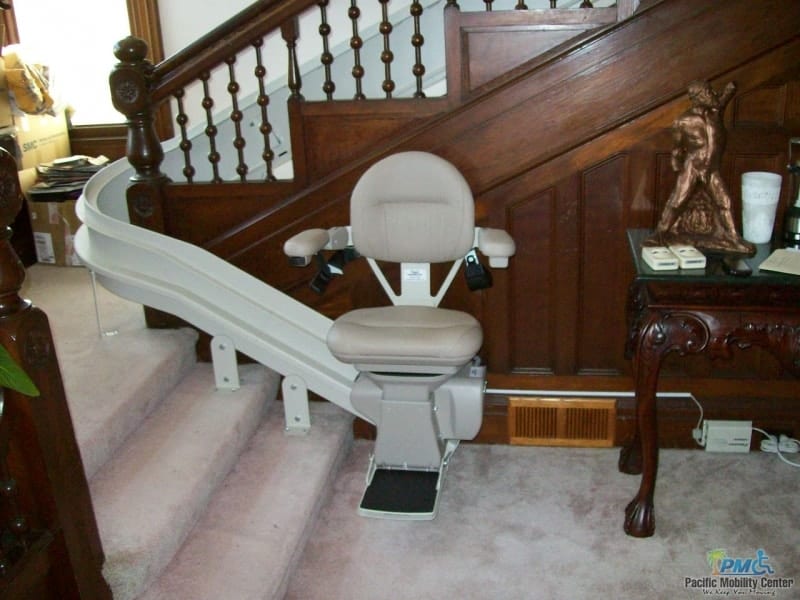When you think of disabilities that could lead to the use of mobility aids, you may overlook individuals living with dementia. Dementia impacts mobility and can impede access around the home and in the community. Stairlifts have surprising benefits for patients with dementia and help to preserve autonomy that might otherwise be lost due to symptoms of this disease.
Did you know that dementia can impact your mobility? Dementia impacts the brain which subsequently controls physical movement and commands. When a glitch occurs, it can impact mobility and increase the chance of a fall or injury. It makes sense to consider mobility aids and options that can make everyday living easier for the individual with dementia, as well as reduce the risk of a nasty fall.
The Disease
Dementia is a nasty, debilitating disease that can strike anyone at any age, but that is most prevalent in senior years. The signs of dementia vary but have common symptoms of forgetfulness, anxiety, confusion, and mood lability. Think you or someone you love has dementia? Your doctor can assess further and look at your own distinct risk factors, including family history.
Mobility
Another faculty that dementia can affect is your depth perception, which can create issues when using stairs. This could result in a dangerous situation and possible fall. Dementia also impacts color contrast, which can also create a hazardous scenario for many.
Some things you can do to make stairs safer include the following:
- Increase color contrast by painting steps or adding treads.
- Add a handrail.
- Remove any hazards that could cause a fall.
- Improve lighting.
Don’t forget that dementia may influence balance and coordination- another recipe for disaster and potential injury. Don’t underestimate the debilitating impacts of a fall, even a minor one, for a senior with dementia.
Accessibility
To prevent a fall and preserve autonomy around the home, install a stairlift. The impacts of a lift can be amazing for anyone who struggles with stairs of risers. Plus, a lift ensures access to areas of the home that may have previously been off-limits. The results of installing a stairlift in the home can be extraordinary.
Assessment
The first step in deciding if a stairlift is a good fit for you (or your loved one) is to visit an occupational therapist. Your primary care practitioner can refer you for this evaluation, and you should be able to glean whether it is something that insurance plans may help cover. The therapist can determine if a stairlift makes sense or if it could pose potential injury for the specific patient – and living situation – in question. Commonly, dementia patients can easily and safely use a lift when there is another individual present to assist.
Safety
Speaking of safety, caregivers or family members may need to provide input or supervision of their loved one using the stairlift. First, you will want to ensure the safety belt is securely fastened. Second, monitor the user to make sure they don’t try to get up and off the lift while it is in motion. The same stairlift safety rules apply to patients with dementia, so practice using it frequently when it is first installed in the home environment. Some basic safety tips include:
- Don’t wear loose or ill-fitting clothing when using the stairlift.
- Don’t carry liquids or attempt to eat or drink when using the lift.
- Don’t let kids use the lift as a toy.
- Only one person should use the lift seat at a time.
- Obey weight restrictions and manufacturer recommendations for safe operation.
- Keep stairways clear of obstructions.
- Keep the lift’s seat folded up and out of the way when it is not in use.
- Make sure to always use the safety belt or seat belt when using the lift.
- Always have your stairlift maintained, repaired, and installed by a professional.
Still unsure about a stairlift? It makes a lot of sense to rent a stairlift first to determine if it is a good fit for you or your loved one. Many vendors rent and this may lead to the decision to invest in your own stairlift, which can be a more cost-effective approach for the long-term.
If someone you love is struggling with access around their home, consider a mobility solution. For those experiencing difficulty with stairs, install a lift – including for those individuals with dementia. There are numerous benefits to a stairlift for someone living with the physical and mental impacts of this disease, but make sure to assess the situation carefully before installing mobility equipment. The best approach is to speak with the mobility professionals at Pacific Mobility for a consultation, evaluation, and assessment before you make any decisions. They are here to walk you through the process and make the transition as smooth as possible for you and your family.
President, Husband, Father, Grandfather Graduate of UC Davis- Bio Sci Major- Go Aggies! Jeff has extensive experience in all of Pacific Mobility’s products and services, and specializes in accessibility products as well as stairlifts, ceiling lifts and custom wheel chairs. His hobbies include spending time with family, gardening, mountain biking, exercising and off road motorcycle riding.
24 years as Owner/President of Pacific Mobility Center – selling, installing, and servicing stairlifts, porch lifts, ceiling lifts, pool lifts, handicap ramping, specialty wheelchairs, scooters, power wheel chairs, and other power mobility devices
Certified Environmental Access Consultant since 2008
Licensed General Contractor since 1998
Certified Aging in Place Specialist since 2016
Board Member for Home Access Professionals
Member of Association of Members of the Accessibility Equipment Industry (AEMA)




